

Second conditional. Everyday Grammar: Present Unreal Conditionals. Accessibility links Languages VOA Learning English PreviousNext Breaking News Live Everyday Grammar TV Everyday Grammar: Present Unreal Conditionals May 01, 2016.

Everyday Grammar: Conditionals (Without "If") Accessibility links Languages VOA Learning English PreviousNext Breaking News Live Everyday Grammar TV.
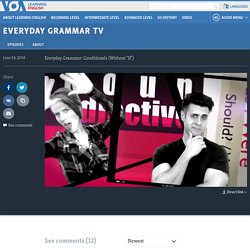
Everyday Grammar: Advanced Conditionals. This week, we are going to talk about the past unreal conditional.
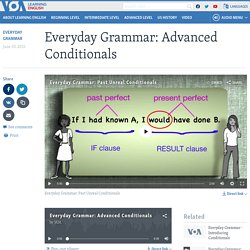
Past unreal conditionals are often used to express wishes about the past. They often show regret, or sad feelings about something that happened in the past. Here's an example: If I had studied, I would have passed the test. In this example, there is an implied wish that the speaker had studied. A conditional sentence has two parts. To form the past unreal conditional, use the past perfect in the if clause.
Use past unreal conditionals to talk about how you would have acted differently if you had had more information. Some Americans use the simple past in the if clause of a past unreal conditional. A conditional sentence can start with the if clause, or the result clause. Clarence: So you still think killing yourself would make everyone feel happier? George: Well I don't know. Speaking Activity: Mistakes in the Past (Mixed/Third Conditional) ESL. Target Language: third conditional, mixed conditional, past modals of regret (should have/could have) ESL Level: Upper-intermediate Time Needed: approximately 25 minutes Number of Students: 2 or more Materials Needed: copies of printout for each pair Worksheet Download: mistakes-in-the-past-roleplays-esl.docx Speaking Activity Description (Note: there is a preview below) I designed this speaking activity so my students could practice the third conditional.
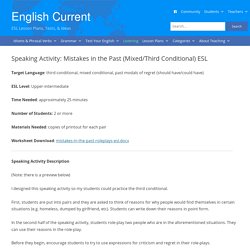
First, students are put into pairs and they are asked to think of reasons for why people would find themselves in certain situations (e.g. homeless, dumped by girlfriend, etc). In the second half of the speaking activity, students role-play two people who are in the aforementioned situations. Before they begin, encourage students to try to use expressions for criticism and regret in their role-plays. My students enjoyed this activity. Third conditional guessing game. If Clause: First Conditional & Future Time Clauses: Ricky & Rachel (Video)
Synopsis of English / ESL Video Watch the love story of Ricky & Rachel and teach the if clause – first conditional with future time clauses for intermediate level classrooms.
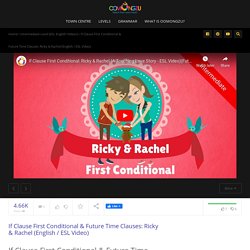
Title of English / ESL Video Ricky & Rachel Target English Grammar. Using 2nd, 3rd & Mixed Conditionals. Mixed conditionals?
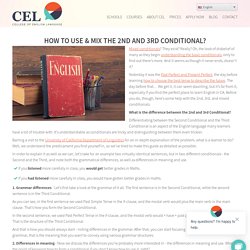
They exist? Really? Oh, the look of disbelief of many as they begin understanding the basic conditionals, only to find out there’s more. And it seems as though it never ends, doesn’t it? Yesterday it was the Past Perfect and Present Perfect, the day before learning how to choose the best tense to describe the future. What is the difference between the 2nd and 3rd Conditional? Differentiating between the Second Conditional and the Third Conditional is an aspect of the English language many learners have a lot of trouble with.
Barring a visit to the University of California Department of Linguistics for an in-depth explanation of the problem, what is a learner to do? In order to explain it as well as we can, let’s take for an example two virtually identical sentences, but in two different conditionals - the Second and the Third, and note both the grammatical differences, as well as differences in meaning and use. 1. 2. Why do we use mixed conditionals? 1. 2. 3rd Conditional - ENGLISH GRAMMAR VIDEOS. Thirdconditionalworksheets. Third Conditional What would have happened. 1st conditional - Mog's Christmas. Gc 38 2nd conditional quizzes. 2nd second conditional reading actitivity done. First second conditional board game. If we didnt have. First conditional card game.
How to Teach the Second Conditional. Teaching the second conditional can be a lot of fun if taught in an engaging way.
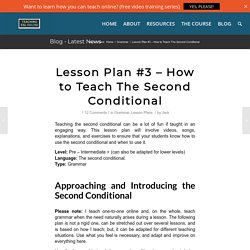
This lesson plan will involve videos, songs, explanations, and exercises to ensure that your students know how to use the second conditional and when to use it. Level: Pre – Intermediate + (can also be adapted for lower levels)Language: The second conditional.Type: Grammar Approaching and Introducing the Second Conditional Please note: I teach one-to-one online and, on the whole, teach grammar when the need naturally arises during a lesson. The following plan is not a rigid one, can be stretched out over several lessons, and is based on how I teach; but, it can be adapted for different teaching situations. Usually, the need to teach the second conditional comes about during conversation, something like this: Me: So, what did you do yesterday? How I use the following materials and suggestions all depends on how my student deals that question. – “Do you play the lottery?”
When to use it.